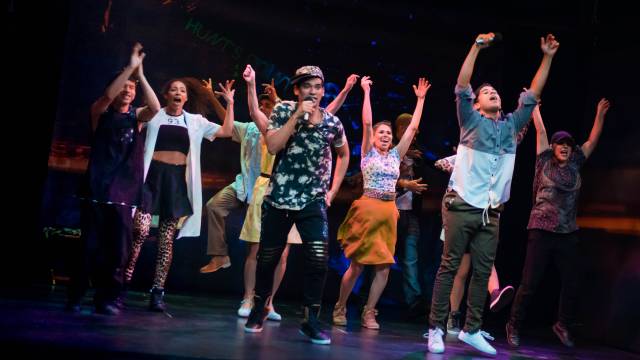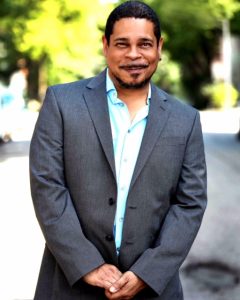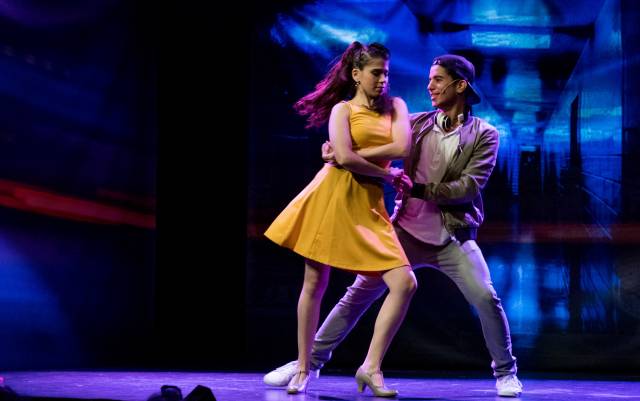

How many musicals in Spanish can you think of? If the answer is zero, you might be onto something. Broadway musicals often get translated into several languages, including Spanish, but the number of original musicals in the language of Cervantes amounts to a surprising zilch (apparently there was one musical in the 80s called Lovy, but it was a commercial disaster upon premiering in Spain and has vanished, also if you happen to know of any others please let us know!). Thanks to artists like Lin-Manuel Miranda, Spanglish has become much more common in mainstream theatre, but there are no other examples of musicals en español. Fortunately that has changed with La Canción, a brand new musical with music and lyrics by Vico C. and a book by Cándido Tirado. The piece was commissioned by Repertorio Español and started performances in September. Combining hip-hop, bachata, cumbia and boleros, among many other genres, La Canción takes place in New York City and centers on a young man’s quest to discover his identity, and achieving artistic fulfillment.
Directed by Edward Torres, La Canción is an exhilarating theatrical experience, quite literally unlike anything else that has played in the US. Featuring wonderful performances and vibrant choreography, not to mention some of Vico C.’s most accomplished songs, La Canción should be just the first of many Spanish musicals we see in New York. Its celebration of a culture that has been under fire during the presidential election is not only welcomed, but cherished as it reminds us of the foundations of America. But before the excitement gets the best of me, let me share my interview with director Torres, who walked me through the process it took to bring the musical to the stage.
I realized watching the show that I had never seen another musical completely in Spanish before. Is this the first you’ve worked in as well?
Yeah, this is actually my first musical period. I always wanted to do a musical, so there were many interesting aspects to this one. I don’t know of many other Spanish musicals either, I know Repertorio Español did one a few years ago, but I think it was more of a play with music. I know there’s that, and also Celia Off-Broadway, which was co-written by Cándido Tirado, but I’m not sure if it was completely in Spanish either.

How did you become involved with this project?
I was familiar with Cándido and Carmen Rivera’s work from a theatre I ran in Chicago called Teatro Vista, I invited him to do a reading of a play, he did and we got along marvelously. I then moved a play from Chicago to NYC, and we started a working relationship. He received a commision from Repertorio to write a musical in Spanish, he asked if I wanted to work with him and of course I said yes. They were looking for a composer, I believe Cándido talked to Don Omar at one point, among others, but then Vico C. came up. They talked to him, he said he’d love to do it, the way his songs are written is very theatrical, there is a message and social relevance to his music that has always been there, which is why it works so well in theatre. We worked on the musical for over two years, since Vico had concerts and other commitments, and it was a wonderful journey all the way to what you saw.
You’re listed in the program as a “gerente de producción musical”, what does that mean?
I managed the musical production, basically I was in charge of getting the studio, sitting in on the sessions, communicating with Vico and Cándido so that when songs were created they fit in the play.
So like a dramaturg for the music?
Yes, also working with the studio people, being in the sessions and managing them.
There’s this character in the play called Concepción, and even though we never see him, we know he’s a recording engineer. Based on what you just told me I’m curious, were you the basis of this character?
I think he’s a result of a very collaborative process between Cándido, the cast and I. We needed to tie things in the story, and it made sense that an engineer would fit in this world of music. A recording engineer spends so much time in the studio, they would know about the person creating music. Especially back when Concepción was working, an engineer would know what he knows.
Even his name is so symbolic! Engineers always have such great memories too, they remember things about random sessions they've sat through.
That’s true.
Was the process of coming up with the title track harder in any way? After all it’s supposed to be “the” song.
No, Cándido was very clear about what the song would be about, and Vico turned in a song that’s memorable and full of passion. It’s a bolero, and also a bachata with a wonderful romantic tone to it. Our culture is so different and we wanted to make the play universal by using as many genres and forms as possible. It’s a musical about different generations so we have salsa, cumbia, hip-hop, rap, all those forms that are relevant to our culture in different ways.

The song is indeed a bridge between generations, and even though we don’t know much about the grandmother I will assume that at one point she was an immigrant, so it made me think of how teenagers are now listening to reggaeton and hip-hop that uses samples of music my grandparents listened to. Was it a challenge to create a cohesive piece despite all the different genres?
Vico did an amazing job with that, we always knew we wanted to open up the show to various generations. Our people don’t just listen to one genre, the grandmother listens to music from the 1930s and people in the audience might recognize them, there’s a bridge in that. Vico composed all the music, he played all those instruments, so he has such great knowledge that that unity came from him. The show is also very focused on the story, it’s not focused on the music, but how the music supports the main story. We have minimal staging so that nothing is wasted and we can focus on the story. I think all we have is a chair (laughs) and not just economically, but conceptually, it works so much better.
Yeah, at its center the show is a hero’s quest.
Exactly, Cándido will be very happy to hear you said that.
Repertorio is a cozy theater and it made me think of audience participation, and how the space helps the audience feel like neighbors or friends of the characters. Did you grow up in an environment of storytelling and music?
Yeah, my grandmother wrote poetry, my mother was a singer, they had other jobs, but one of my mom’s favorite things to do was sing, all our relatives would come and tell stories. That’s definitely something I can relate to. Sometimes in shows like this, the choreography or music can dominate, so Cándido and I wanted for the story to be the main focus.
As people will talk about this being the first Spanish musical, in maybe forever, does this bring any pressure?
It’s a really important bridge to create. We had this thing called the “Latin explosion”, and really we just keep exploding, because Latinos are more than just one thing. We want people to know there are differences in our culture, our cast is from so many different countries. In that regard, it can be daunting to make this show, because we want people to see it and if we take it to other places we want to have an audience for it. I think the language will help reach people who don’t usually go to the theater. But actually, yeah it’s great to be the first Spanish musical in the US! I would love for people to see the show, there is a lot going on right now, Lin-Manuel opened a door on Broadway, there’s a new musical called I Like It Like That playing Off-Broadway. The Spanish language unites people from Mexico, Cuba, so many places, it’s something universal that celebrates our differences but also makes us stronger.
Are you planning to do a cast recording?
We are definitely exploring that!
I can’t wait!
Great! It’s a different kind of thing, we’re still working on it, I’m there a few times a week, we’re constantly making improvements. It’s completely worth it!
For tickets to La Canción visit Repertorio Español’s website.